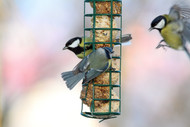Wild Bird Feeding - The Essentials
Posted by Darren Walton on 3rd Oct 2022
While winter feeding clearly offers the most benefit to wild birds, food shortage can occur at any time of the year. By offering food throughout the year you will give birds the best chance to survive and thrive.
During the Autumn and Winter period food and water should be offered on a regular basis; in case of severe weather try to offer food twice a day where possible – ideally in the morning and then again early afternoon. During this time birds will require high energy (high fat) foods to sustain them in the cold weather. Fat balls, suet blocks or suet pellets as well as peanuts are ideal as a high quality, high fat bird food. Ideally feed these in a suitable feeder or holder to prevent mess as well as preventing unwanted pests from indulging in the food intended for the birds. For similar reasons the quantity offered should be adjusted to meet demand and waste food should not be allowed to accumulate around the feeders. Try and stick to a feeding routine once established as the birds will become used to it and visit accordingly.
Requirements in the Spring and Summer months differ but this is no reason to stop feeding all together, simply adjust the food type you offer. Indeed, food shortage can happen at any time of year and if this occurs during breeding season this is potentially catastrophic – the food on your bird table may make a big difference to the survival of young in the nest. Birds require high protein foods during this time, particularly during the moult. A good quality wild bird mix, mealworms, sunflower hearts, nyger seed, sunflower seeds are ideal for this time of year. During the spring and summer months peanuts, fats and bread should be avoided – if adult feed these to their nestlings there is a potential for choking. Home-made fat balls are likely to go soft and rotten during the warmer months, whilst commercially produced ones are often suitable for warmer weather these should still be discarded after around 3 weeks.
In order to ensure the safety of the food you put out for the birds it is important not to overlook the importance of good hygiene, particularly during the summer months when the food can go off more quickly.
- If food is taking days to clear – feed less.
- If possible use a bird table or feeder which can be hung. If this is not possible use a feeding tray rather than placing food directly on the ground. This not only makes it easier to ensure the feeding environment is kept clean but allows complete removal of food from the ground before nightfall when rats and other vermin may visit for leftover food. Rats etc also carry disease which may be dangerous to wild birds.
- Ensure that feeders and tables are kept free from mouldy food and droppings as these provide an excellent breeding ground for bacteria and parasites.
- Tables and feeders should be cleaned regularly ideally with a disinfectant solution – those you need to ensure this is safe for use.
- Tables and feeders should be moved regularly to prevent accumulation of droppings underneath.
- Water containers should be rinsed daily and allowed to dry before refilling.
- DON’T FORGET – your personal hygiene is important. Feeders etc should be cleaned outside using separate equipment from your home cleaning products. Wear suitable gloves when cleaning bird tables or clearing up bird mess etc. Always wash your hands thoroughly when you have finished.

